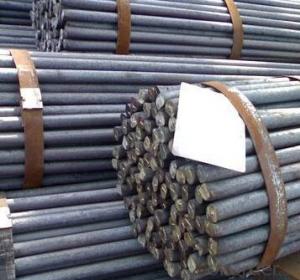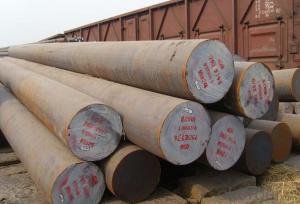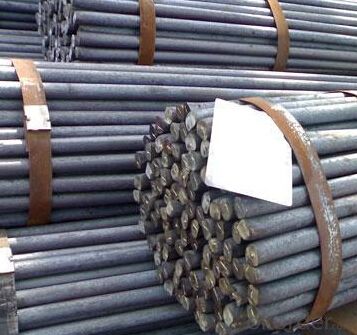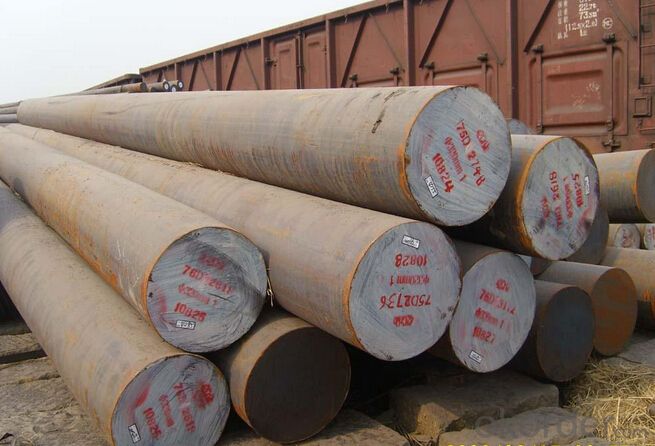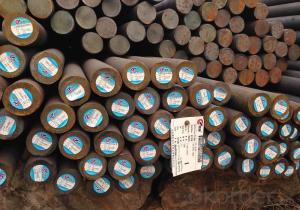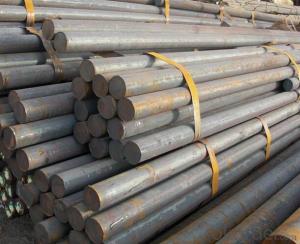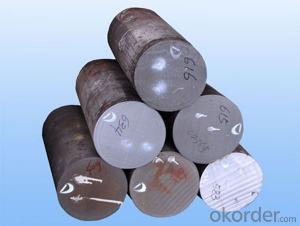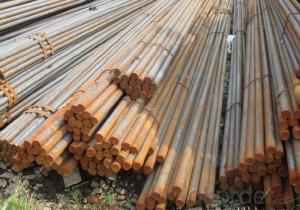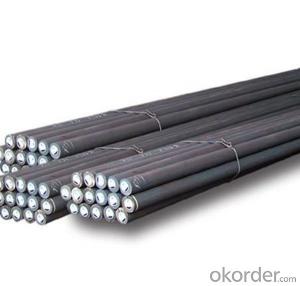Special Steel 42CrMo/1.7225 Working Mould Steel
- Loading Port:
- China main port
- Payment Terms:
- TT or LC
- Min Order Qty:
- 25 m.t.
- Supply Capability:
- 10000 m.t./month
OKorder Service Pledge
OKorder Financial Service
You Might Also Like
Specification
The details of our Steel
1. Produce Standard: as the GB, AISI, ASTM, SAE, EN, BS, DIN, JIS Industry Standard
2. Produce processes: Smelt Iron -EAF smelt Billet - ESR smelt Billet -Hot rolled or forged get the steel round bar and plate
3. Heat treatment:
Normalized / Annealed / Quenched+Tempered
4. Quality assurance:
All order we can received Third party inspection, You can let SGS, BV,.. and others test company test and inspect our products before Goods shipping.
Product information
Chemical Composition(%)
C | Si | Mn | Cr | Mo | Ni | P | S |
0.38-0.45 | 0.17-0.37 | 0.50-0.80 | 0.90-1.20 | 0.15-0.25 | ≤0.030 | ≤0.030 | ≤0.030 |
Standard
GB | AISI | DIN | JIS | ISO |
42CrMo | 4140 | 42CrMo4 | SCM440 | 42CrMo4 |
Available Size
Rolled round bar | φ20-120mm × L |
Forged round bar | φ130-195mm × L |
Heat Treatment
Item | Temperature℃ | Hardness |
quenching | 840-880 | HRC32-34 |
tempering | 580 | |
quenching | 900 | HRC54-60 |
tempering | 150-180 |
Applications: The steel is suitable for manufacturing requires a certain strength and toughness of large and medium-sized plastic mold
Product show

Workshop show

- Q: How does special steel contribute to the automotive suspension spring industry?
- Special steel contributes to the automotive suspension spring industry by providing enhanced strength, durability, and flexibility. This type of steel allows suspension springs to withstand the constant stress and load of vehicle weight, while also providing optimal ride comfort and handling. The high-quality properties of special steel help suspension springs to maintain their shape and performance over time, ensuring a smooth and stable ride for vehicles.
- Q: What are the different methods of surface finishing for special steel?
- Special steel can be finished using various methods, each with its own advantages and the ability to meet specific aesthetic or functional needs. Some commonly utilized techniques include: 1. Electroplating: Through an electrochemical reaction, a layer of metal is deposited onto the surface of the special steel. This process enhances corrosion resistance, improves appearance, and can increase hardness or wear resistance. 2. Passivation: A chemical treatment is employed to eliminate surface contaminants and form a thin oxide layer on the special steel. This treatment enhances corrosion resistance by preventing rust or other oxidation products from forming. 3. Polishing: Utilizing abrasive materials, a mechanical process is employed to remove a thin layer of the steel surface, resulting in a smooth and glossy finish. This method is often used to enhance the appearance of special steel products or achieve a desired level of reflectivity. 4. Shot blasting: Tiny metal beads or shots are propelled at high speeds onto the surface of the special steel. This technique removes scale, rust, or other surface contaminants, resulting in a clean and textured finish. Shot blasting is commonly employed to prepare the steel for subsequent coating or painting applications. 5. Physical vapor deposition (PVD): A vacuum-based coating process is used to deposit a thin layer of material onto the special steel surface. This method offers excellent adhesion, wear resistance, and the ability to provide various colors or finishes to enhance the steel's aesthetics. 6. Powder coating: Dry powder is applied onto the special steel surface and then cured under heat to form a protective and decorative layer. This method offers excellent corrosion resistance, durability, and a wide range of color options. 7. Anodizing: An electrolytic process is employed to create a controlled oxide layer on the surface of specific special steel alloys. This process increases corrosion resistance, improves appearance, and can enhance hardness or wear resistance. These methods are just a selection of the numerous options available for surface finishing special steel. The choice of method will depend on factors such as the desired finish, functional requirements, and the specific properties of the steel being used.
- Q: What are the different types of alloy steel?
- There are several different types of alloy steel, including stainless steel, tool steel, maraging steel, high-strength low-alloy steel (HSLA), and nickel-based alloy steel.
- Q: How does special steel contribute to the agricultural sector?
- The agricultural sector benefits greatly from the use of special steel in multiple ways. Firstly, special steel's strength and durability make it an ideal material for manufacturing various agricultural machinery and equipment. Tractors, plows, harvesters, and irrigation systems, among others, all require sturdy and reliable components. Special steel provides the necessary strength and resistance to wear and tear, enabling these machines to withstand the demanding conditions of agricultural work. In addition, special steel is perfect for producing high-quality cutting tools that are essential in farming operations. Sickles, scythes, and pruning shears, for example, need to have sharp and durable blades for efficient vegetation cutting. Special steel's hardness and strength make it a suitable material for manufacturing such tools, ensuring they maintain their sharpness even with prolonged use. Moreover, special steel contributes to the agricultural sector by enabling the construction of strong and durable infrastructure. Agricultural buildings, storage facilities, and fencing often require materials that can withstand the elements and protect crops, livestock, and equipment. Special steel, with its resistance to rust and structural integrity, can be used in the construction of barns, silos, sheds, and fencing, providing long-lasting and reliable structures. In summary, special steel plays a vital role in the agricultural sector by providing the necessary strength, durability, and corrosion resistance for the manufacturing of machinery, cutting tools, and infrastructure. These properties enhance efficiency, productivity, and reliability in agricultural operations, ultimately benefiting farmers and the overall agricultural industry.
- Q: How does the composition of special steel affect its mechanical properties?
- The composition of special steel significantly affects its mechanical properties. Various alloying elements such as carbon, manganese, chromium, nickel, and others are added in specific quantities to enhance the steel's strength, hardness, toughness, and corrosion resistance. The presence and ratio of these elements determine the steel's microstructure, which in turn determines its mechanical properties. For example, higher carbon content increases hardness and strength, while manganese improves toughness. Similarly, chromium and nickel increase corrosion resistance and provide better heat resistance. Therefore, the composition of special steel plays a crucial role in defining its mechanical properties.
- Q: What are the challenges in forming special steel?
- Several challenges arise when forming special steel due to its unique characteristics and properties. Some of the primary difficulties include: 1. The high melting point of special steels necessitates the use of specialized equipment and processes for heating and shaping the material. This can result in increased energy consumption and costs. 2. Special steels typically contain various alloyed elements to enhance their properties, such as strength, hardness, and corrosion resistance. However, controlling the alloy composition precisely can be challenging, as even minor variations can have a significant impact on the material's properties. 3. Certain special steels, such as tool steels, have a high carbon content to improve hardness and wear resistance. Unfortunately, this high carbon content makes the material more susceptible to cracking during forming processes like forging or rolling. Great care must be taken to prevent cracks and achieve the desired shape. 4. Special steels often require specific heat treatment processes, like quenching and tempering, to achieve the desired mechanical properties. These processes can be complex and require precise control of temperature, time, and cooling rates. Improper heat treatment can result in poor material performance or even structural failure. 5. Achieving the necessary surface finish and dimensional accuracy is crucial in applications where special steels are used, such as the aerospace or automotive industry. This can be challenging during forming operations, necessitating advanced tooling and precision machining techniques. 6. Forming special steels may require specialized equipment and expertise, such as high-pressure hydraulic presses, induction heating equipment, or vacuum furnaces. These specialized tools and processes add complexity and costs to the manufacturing process. Despite these challenges, forming special steels is vital in various industries that require their unique properties. Manufacturers continually invest in research and development to overcome these challenges and enhance the forming processes of special steels.
- Q: How does special steel contribute to the energy sector?
- Special steel plays a critical role in the energy sector, contributing significantly to its efficiency, reliability, and safety. Firstly, special steel is used in the construction of pipelines and storage tanks, which are crucial components of the oil and gas industry. These pipelines need to withstand high pressures, extreme temperatures, and corrosive environments, and special steel provides the necessary strength and resistance to ensure their integrity and prevent leakage. In addition, special steel is utilized in the manufacturing of turbine blades and other components in power generation plants. These plants require materials that can withstand the high temperatures and pressures generated by the combustion of fossil fuels or the use of nuclear energy. Special steel's heat-resistant properties make it ideal for these applications, improving the overall efficiency and longevity of power plants. Furthermore, special steel is used in the production of wind turbines, which are rapidly becoming an essential source of renewable energy. The blades, tower structures, and gearboxes of wind turbines are subjected to significant stress and strain, and special steel provides the necessary strength and durability to withstand these conditions. By using special steel, wind turbines can operate reliably and efficiently, contributing to the growth of clean energy. Moreover, the energy sector relies on special steel for its infrastructure, such as transmission towers and substations. These structures need to support heavy loads and withstand extreme weather conditions while maintaining electrical conductivity. Special steel's high strength and corrosion resistance make it a suitable material for these applications, ensuring the reliable transmission and distribution of electricity. Overall, special steel plays a crucial role in the energy sector by providing the necessary strength, durability, and resistance to extreme conditions. Its use in pipelines, power generation plants, wind turbines, and infrastructure improves the efficiency, reliability, and safety of the energy sector, facilitating the production and distribution of both conventional and renewable energy sources.
- Q: What are the different methods of improving the corrosion resistance of special steel?
- There are several methods available for improving the corrosion resistance of special steel. Some of the commonly used methods include: 1. Alloying: One of the most effective ways to enhance corrosion resistance is by alloying the steel with specific elements. For example, adding chromium to steel forms a protective chromium oxide layer on the surface, which acts as a barrier against corrosion. Other elements like molybdenum, nickel, and copper can also be added to improve corrosion resistance. 2. Surface treatments: Various surface treatments can be applied to the steel to enhance its corrosion resistance. For instance, galvanizing involves coating the steel with a layer of zinc, which protects it from corrosion. Electroplating is another method where a thin layer of a more corrosion-resistant metal, such as nickel or chromium, is deposited onto the steel surface. 3. Passivation: Passivation is a chemical process that removes free iron and other contaminants from the steel surface, creating a passive film that aids in corrosion resistance. This method is commonly used for stainless steel, where a thin layer of chromium oxide is formed by treating the steel with an oxidizing agent like nitric acid. 4. Protective coatings: Applying protective coatings on the steel surface can significantly improve its corrosion resistance. There are various types of coatings available, such as paints, epoxy coatings, and ceramic coatings. These coatings act as a barrier between the steel and the corrosive environment, preventing direct contact and corrosion. 5. Heat treatment: Heat treatment techniques like annealing, quenching, and tempering can modify the microstructure of the steel, enhancing its corrosion resistance. Heat treatment can improve the steel's mechanical properties, reduce residual stresses, and remove impurities, all of which contribute to better corrosion resistance. 6. Design considerations: Proper design and construction techniques can play a crucial role in improving the corrosion resistance of special steel. For example, eliminating sharp corners and crevices where corrosion can occur, using appropriate drainage systems, and ensuring proper ventilation can prevent the accumulation of moisture and corrosive agents. It is worth noting that the selection of the most suitable method depends on the specific application, environment, and desired level of corrosion resistance. A combination of these methods may also be employed to achieve optimal results.
- Q: How is special steel recycled?
- Special steel can be recycled through a process called electric arc furnace (EAF) recycling. In this method, the steel scrap is melted in an electric arc furnace, where impurities are removed and alloying elements are added to obtain the desired composition. The molten steel is then cast into new shapes or used to produce various steel products. This recycling process helps to conserve resources, reduce energy consumption, and minimize waste in the steel industry.
- Q: How long does special steel typically last in various applications?
- The lifespan of special steel in various applications can vary significantly depending on factors such as the type of steel, the specific application, and the conditions it is subjected to. However, special steel is generally known for its durability and longevity, and it can last for several decades or even longer in many applications, especially when properly maintained and used within its recommended limits.
Send your message to us
Special Steel 42CrMo/1.7225 Working Mould Steel
- Loading Port:
- China main port
- Payment Terms:
- TT or LC
- Min Order Qty:
- 25 m.t.
- Supply Capability:
- 10000 m.t./month
OKorder Service Pledge
OKorder Financial Service
Similar products
Hot products
Hot Searches
Related keywords
